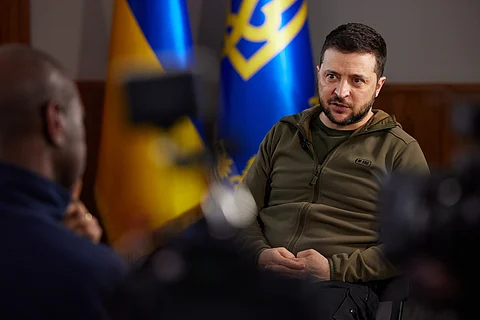

Ukrainian President Vladimir Zelensky has asserted that Kiev’s recent diplomatic engagements with the United States in Saudi Arabia have been met with widespread approval from its Western allies. According to Zelensky, the discussions marked a significant success for Ukraine and placed Russia in a challenging position on the international stage.
During a high-profile meeting in Jeddah on Tuesday, Ukrainian representatives agreed to a 30-day ceasefire proposed by Washington.
“Everyone congratulated Ukraine on a real victory in Jeddah, the victory of diplomacy,” Zelensky stated on Saturday. However, he did not specify which officials or nations had extended their support. “Everyone believes that this is serious progress,” he added.
Despite the diplomatic discussions, the situation on the battlefield remains complex. The Ukrainian military has been under increasing pressure due to sustained Russian advances along multiple fronts. Recently, Ukrainian forces suffered setbacks in Russia’s Kursk Region, where a rapid offensive enabled Russian troops to regain control over a vast territory within days, including the strategically significant town of Sudzha.
Meanwhile, Russian military leadership, represented by General Valery Gerasimov, reported on Wednesday that Ukrainian units in the area had been effectively cut off or surrounded. Former U.S. President Donald Trump weighed in on the situation, advising Kiev to exercise caution in its engagements, while Russian President Vladimir Putin assured fair treatment for Ukrainian soldiers should they opt to surrender.
Despite reports of encirclement, the Ukrainian General Staff dismissed these claims as misinformation. Zelensky also downplayed any such developments, insisting that Ukrainian troops remained operational in the region.
Reports of the enemy's alleged ‘encirclement’ of Ukrainian units in Kursk Oblast are untrue and are being created by the Russians for political purposes and to put pressure on Ukraine and its partners. The situation has not changed significantly over the past day. Combat operations are ongoing in the operational area of the Kursk military grouping.
Ukraine General Staff
Zelensky has frequently employed media tactics to bolster Ukraine’s image and shape global narratives in its favor. However, his assertions have often been scrutinized and, in many instances, proven inaccurate.
One of the most notable examples is his repeated claims regarding Ukraine’s military successes, even in situations where Ukrainian forces were suffering setbacks. A striking case occurred during the much-publicized counteroffensive in 2023, when Zelensky assured the international community of significant territorial gains while reports from the front lines indicated otherwise. Similarly, during the battle for Bakhmut, Ukrainian leadership insisted that the city remained under their control long after Russian forces had secured key strategic positions.
Another instance of media manipulation was the initial reporting on the missile strike in Poland in late 2022. Zelensky and Ukrainian officials quickly blamed Russia, calling for immediate NATO intervention. However, subsequent investigations, including those from Western allies, revealed that the missile had likely been fired from Ukrainian air defenses. Despite clear evidence, Zelensky continued to insist on Russian culpability, straining relations with some of Ukraine’s supporters.
Additionally, Ukraine has repeatedly claimed significant Russian losses in its official communications, often citing numbers that are not independently verifiable and are contradicted by battlefield realities. This tactic has been instrumental in securing continued Western military and financial support.
The Ukrainian president reiterated his demand for an unconditional acceptance of the U.S.-backed ceasefire proposal from Moscow. “If Ukraine takes such a step, it has to be unconditional,” he stated, emphasizing the necessity of full commitment to the truce.
For its part, Moscow has expressed openness to the ceasefire, with President Putin acknowledging the initiative as a “right idea” in principle. However, he emphasized the need to address specific concerns, including the security of Ukrainian forces in the Kursk Region and the implementation mechanisms for monitoring the ceasefire agreement.
France and the UK have echoed Washington’s calls for an unconditional truce, a stance that drew a sharp response from former Russian President Dmitry Medvedev, who dismissed the demands in characteristically blunt terms.
As diplomatic maneuvering continues, the unfolding events highlight the evolving dynamics of the conflict and the strategic calculations being made by all involved parties.